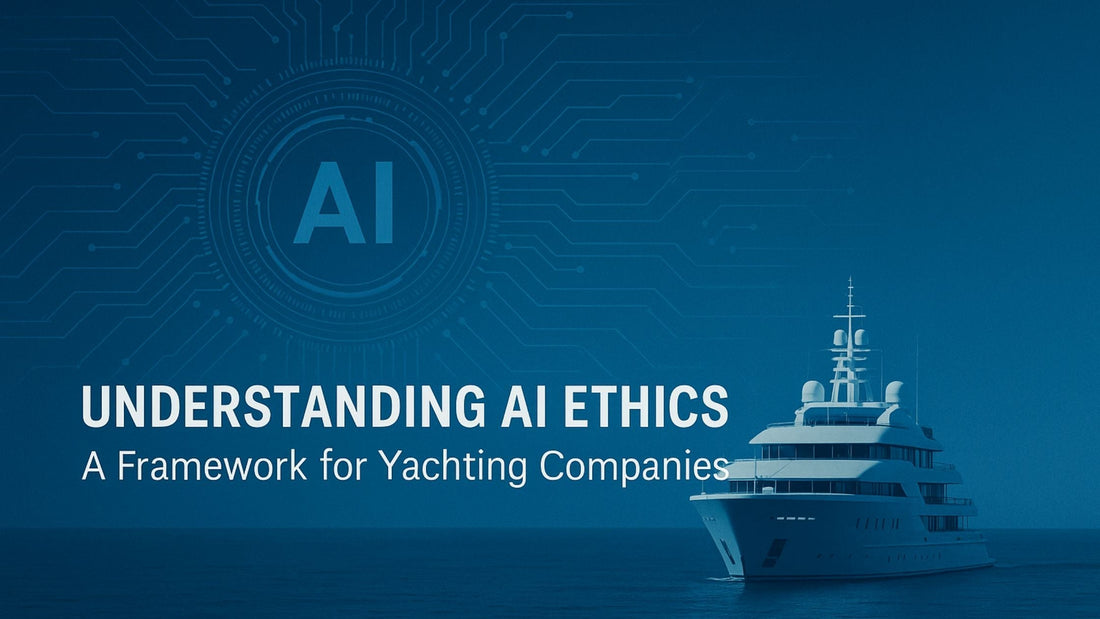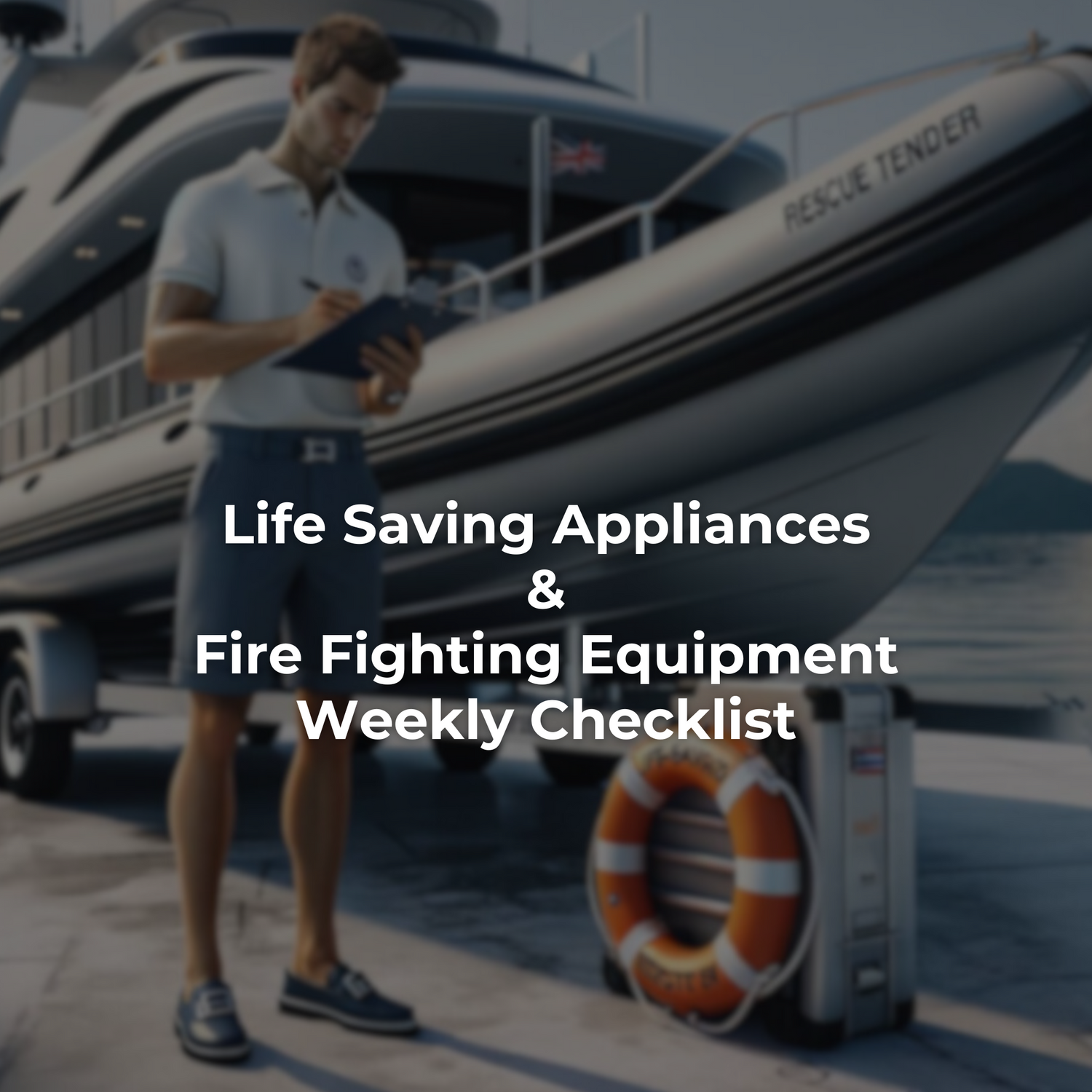By Rebecca Whitlocke For Our Faceless Crew
The use of artificial intelligence (AI) is transforming industries globally, and the yachting sector is no exception. AI can streamline operations, support interactions with customers, and optimise content creation. However, as AI becomes more integrated, ethical considerations must take importance. The speed at which generative AI technology is developing isn’t making this task any easier.
On January 29, the US Copyright Office issued a report on the copyrightability of works consisting of or incorporating material generated by artificial intelligence (AI) systems, while on February 2nd the first rules from the EU AI Act came into force.
Yachting companies are in a unique position to embrace AI responsibly while ensuring compliance with regulations such as the EU AI Act. This article explores the ethical challenges of AI and offers a clear framework for implementing responsible AI in the yachting industry.
Specific Examples of AI Implementation in the Yachting Industry
McKinsey published a great report about the economic potential of generative AI where they stated: “About 75 percent of the value that generative AI use cases could deliver falls across four areas: Customer operations, marketing and sales, software engineering, and R&D.” Let’s take a closer look at some of the ways that AI is affecting the yachting sector.
AI and Employment
What impact does AI have on jobs in the yachting sector? Jobs are being impacted by AI as it optimises operations, especially in fields like fleet management, customer service, and even content creation. How can businesses strike a balance between automation, service needs and giving employees fulfilling job opportunities? AI has opened up new opportunities and obstacles with how we communicate and create.
One use case is generative AI being able to instantly retrieve data a company has on a specific customer, which can help a human representative more successfully answer questions and resolve issues during an initial interaction. Another use case is using AI for marketing purposes to identify and monitor trends, key drivers, and market opportunities.
AI in the Management and Maintenance of Yacht Fleets
By evaluating sensor data and past records, AI can forecast when yachts need maintenance. This lessens the need for expensive maintenance and downtime. AI has great promise for automating onboard maintenance duties while adhering to maritime laws. However, in order to save money, we must make sure AI doesn't ignore hazards.

AI-Driven Customisation
AI-powered platforms like Guest Trip can improve the guest experience because of its ability to rapidly identify charter destinations or interests tailored to guest preferences. This improves communication between brokers, crew, and guests all in a singular platform.
Yachting companies should, however, make sure that all information is correct and source checked and that clients are completely aware of how their data is used and have the ability to choose what information they give you.
AI in Brokerage Pricing
AI can be used by dynamic pricing systems to modify charter rates according to customer characteristics, seasonality, and demand. Revenue can be maximised, but unfair pricing could also be a problem. Yachting businesses should make sure that their AI pricing strategies are open and equitable to clients in differing geographic locations.
AI in Emergency or Crisis Circumstances
How dependable are AI systems in emergency scenarios like medical crises or mechanical breakdowns? Yachting firms need to be aware of testing and real-life scenarios.

Ethical Challenges of AI
AI offers significant potential but raises several ethical concerns: bias, transparency, privacy, and accountability.
Bias and Fairness
AI learns from data, and biased data leads to biased decisions. In yachting, we have existing diversity and inclusion issues with marketing collateral, imagery on yachting websites and speaker panels at yachting events.
When serving a worldwide, diversified clientele, yachting must overcome the challenges posed by bias in AI systems. For example, AI-driven pricing or suggestions may inadvertently favour particular brands or groups, creating unfair options. AI tools and platforms will likely integrate in-platform advertising, so we need to manage expectations about advertising and communication.
Openness
Customers should be made aware of how their data is utilised if a yachting firm utilises AI for marketing or to recommend services or itineraries. Transparency guarantees confidence in AI systems and fosters trust.
Data security and privacy
Yachting systems gather personal information, including preferences. To guarantee privacy and security, businesses must adhere to data protection regulations such as the GDPR and put in place stringent data governance and cyber security procedures.
Accountability and Responsibility
Successful strategies must combine AI tools with human cultural awareness, conceptual and strategic thinking. Yachting companies must remain accountable for output such as checking sources for accuracy and ensuring there’s no plagiarism. Brands need a framework to ensure that human oversight is maintained and errors are corrected before impacting customers.
Regulatory Landscape: The EU AI Act and Beyond
As AI technologies evolve, governments are developing frameworks such as the EU AI Act to promote transparency and reduce risks like bias and privacy violations. The EU AI Act categorises AI systems into three risk levels: unacceptable, high, and low. Customers must be aware when they interact with AI, and systems must be tested to prevent bias in pricing and service recommendations.
AI, Copyright, and Intellectual Property: What Yachting Companies Need to Know
I would hazard a guess that the majority of yachting companies don’t even have an asset management process in place that covers clearance and credits, and clearly documents employee training on AI systems, or the origin of visual assets that may factor into a generative AI activation now or in the future.
AI is increasingly used to generate marketing materials, including copy, images, and videos. However, copyright and intellectual property (IP) issues arise as AI creates content that may resemble human-created work.
Here’s what yachting companies need to understand:
1. Who Owns the Content Created by AI?
Under EU copyright law, only works that show "human intellectual creation" can be protected. Courts and lawmakers have made it clear that AI, on its own, does not count as an author. If humans play a meaningful role in shaping the output, they may be able to claim copyright. The EU Copyright Directive (2019/790) reinforces this principle, requiring a work to reflect the author's personality and free, creative choices. In the US, the US Copyright Office takes a similar stance: If a work is entirely AI-generated, it’s not eligible for copyright.
AI-generated content is not necessarily subject to fair use laws. Yachting companies may still be subject to legal repercussions if they imitate copyrighted products. Unfortunately, even on social media we can see daily examples of copyright and plagiarism breaches in the yachting industry. To prevent possible copyright infringement, it is essential to make sure AI-generated material is unique.
Large text databases, like Wikipedia or Reddit, which may contain protected content, are used to train AI tools. Businesses should use licensed content, confirm sources, and for yachting companies operating across borders you should consider the variations in copyright laws and moral rights.
2. Licensing and Permissions for AI-Generated Content
AI platforms have licensing agreements that dictate how generated content can be used - similar to how brands already use stock photos. Yachting companies should review these terms to ensure they have the appropriate rights to use the content in marketing campaigns. Some platforms allow users to retain ownership, while others grant partial rights to the platform. Third-party restrictions may also apply if the AI tool was trained on copyrighted data.
3. Ethical Concerns Around Best Practices
As AI continues to embed into the yachting industry, adopting a responsible AI framework is both a legal obligation and a competitive advantage. By establishing clear guidelines, ensuring data privacy, and maintaining human oversight, yachting companies can implement AI ethically and ensure regulatory compliance. Stay ahead of the curve, implement an AI framework and position your yachting business as a leader in responsible AI use.
Here are five steps yachting companies can take to implement AI responsibly:
1. Establish Ethical Guidelines and Ownership
Create ethical guidelines covering fairness, transparency, and accountability. Form a committee and consult with AI developers and legal experts. This should not be a tick box exercise; integrate these principles into your company culture and operations. Yachting companies need to document clear records of how human decisions, editing, or curation lead to the final output because this is vital in establishing authorship.
Likewise, employees - especially marketing staff or content creators - need to be aware of contractual agreement. Contracts should define the ownership of any AI-generated content. Businesses should include clear ownership clauses that specify who holds the rights to the content, whether it is the company, the employee, or another party.
2. Ensure Data Privacy and Protection
Establish strong data governance and security practices to protect customer data and comply with data consent and privacy regulations like GDPR.
3. Maintain Human Oversight
AI systems should complement human judgment. Ensure human oversight in decision-making to ensure ethical standards are met. Add your insights and perspective: AI lacks human judgment—use your expertise to draw conclusions, challenge assumptions, and include actionable advice your audience can’t find elsewhere.
4. Regular Audits and Updates
AI systems require monitoring and updates. Regularly review AI-generated text, images, pricing and videos to ensure they align with your brand identity and do not infringe on the IP of others. This includes checking for potential plagiarism and ensuring compliance with IP laws.
5. Staff Training and Education
Invest in training for staff on AI ethics, data privacy, and intellectual property compliance to avoid risks and ensure responsible use of AI within the legal framework. Ensure that the AI platforms you use for content creation provide clear, commercial-use licenses for the output, or use tools that allow you to hold full rights to the work.
Some introductory training resources include:
• Goggle Cloud Skills Boost: “Introduction to Responsible AI”
• AWS Skill Builder: “AWS Flash - Introduction to Responsible AI”
• LinkedIn AI ethics mini course: https://www.linkedin.com/learning/ethics-in-the-age-of-generative-ai/generative-ai-and-ethics-the-urgency-of-now
• Microsoft Learn: https://learn.microsoft.com/en-us/training/modules/embrace-responsible-ai-principles-practices/
Conclusion: AI Integrity in a New Era
If you haven’t done so already, yachting business owners should act now to familiarise themselves with AI ethics and regulatory requirements. Start by reviewing your current AI procedures, ensuring they align with ethical standards, and taking steps to implement responsible AI frameworks and training your employees. By doing so, you’ll position your maritime company as a leader in the responsible use of AI, gaining the trust of customers and stakeholders alike while ensuring compliance with evolving regulations.
This article is not a complete outlook, however I hope you have formulated some questions and it has prompted superyacht companies to think about how AI is integrated into their operations and the broader societal implications that go beyond legal compliance.
Note from Our Faceless Crew
Thanks to Rebecca Whitlocke for this insightful and timely article. As of June 2025, AI continues to develop quickly, so we wanted to share a few extra notes to help readers make the most of the information:
• On Copyright and Human Input: The rules about who owns AI-generated content are still being figured out. In many cases, a person has to play a real role in shaping the final result to claim ownership and this can vary depending on the country.
• Using AI with Customer Data: AI can help personalise guest experiences, but it’s important to stay within data privacy laws like GDPR. That includes getting clear consent and letting people know how their data is used.
• Fairness in AI Pricing: Smart pricing tools can be great for business, but companies also need to make sure prices stay fair and easy to understand—especially for clients in different locations.
• AI in Emergencies: While AI might one day help during onboard issues like medical or mechanical problems, those tools need to be carefully tested and may fall under stricter rules.
• Managing Content and Assets: Not all companies have formal systems for tracking images, videos, or marketing content, especially when AI is involved, but it’s becoming more important to do so to avoid legal issues and protect your brand.
We hope this added context is helpful as the industry explores AI responsibly. The technology, regulations and best practices are still changing, so staying informed is the best course forward.
Our Faceless Crew
Further Resources:
* The EU AI Act
* The 2021 Coordinated Plan on Artificial Intelligence
* Copyright Registration Guidance: Works Containing Material Generated by Artificial Intelligence, 88 Fed. Reg. 16,190 (Mar. 16, 2023)
* U.S. Copyright Office, Copyright and Artificial Intelligence Part 1: Digital Replicas (July 2024)
* U.S. Copyright Office, Copyright and Artificial Intelligence, Part 2: Copyrightability (January 2025)
* ISO/IEC 42001:2023\
* McKinsey: The Economic Report of Generative AI (June 2023)




